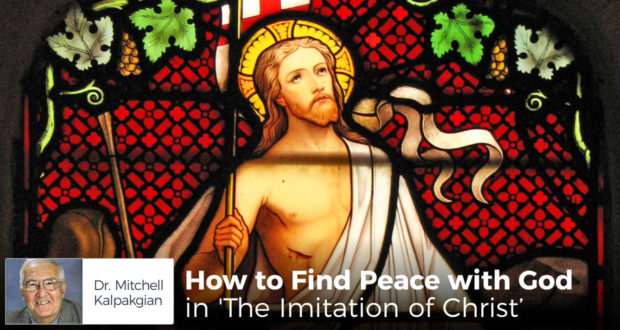Thomas a Kempis’s The Imitation of Christ, the most beloved book in Christendom after the Bible, explains the way of peace for all who are restless and weary and seek God’s peace to refresh the soul.
In a fallen world that burdens man with weariness, trouble, and struggle, the soul naturally yearns for an abiding peace that the world does not offer, only God: “Peace I leave with you; my peace I give to you; not as the world gives do I give to you.” (John 14:27)
As the Rule of St. Benedict shows, to be at peace with one’s environment, with neighbor, and with one’s self-composes and disposes the soul for peace with God. God enters the soul that is properly prepared, cultivated, receptive, purified, and seeking union with God.
The Human Condition
The book explains the human condition: everyone experiences restlessness and weariness, and mortal life only offers temporary rest. “When one temptation or trial draws to a close, another takes its place; and we shall always have something to fight, for man has lost the blessing of original happiness.”
Every human being bears crosses. If he does not have one at the moment, he will soon carry one. After he is relieved of the burden of the cross he endures, he will soon acquire another difficulty to conquer.
In a world that burdens everyone with a variety of crosses, some great and small, a person must exercise great patience and humility in order to live in peace: “Strive to be patient; bear with the faults and frailties of others, for you, too, have many faults which others have to bear.”
Because of the perpetual nature of life’s warfare, patience suffers the hardships without losing hope, and humility recognizes man’s dependence on God for the comfort and consolation the soul needs. In the familiar words of Psalm 23, “He leads me beside the still waters; he restores my soul.”
The Way of Peace
The way of peace, however, does not rest on a technique or method but a particular state of mind or disposition, a receptivity and openness to God’s gift of love that anticipates His coming in the way the bride in The Song of Solomon awaits her beloved bridegroom.
The way of peace does not operate on the basis of guaranteed instant results or scientific predictability but upon the mystery of God’s law of love, the mutual giving and receiving that is always new and surprising.
A Kempis writes, “Love flies, runs, and leaps for joy; it is free and unrestrained . . . . Love knows no limits, but ardently transcends all bounds.”
The way of peace resembles the art of love’s initiating and responding in spontaneous ways that follow no script, schedule, or contract. It is not like taking medicine to relieve a headache or exercising to relieve stress or eating to alleviate hunger.
It is not an Aladdin’s lamp that conjures a jinni (genie) to do one’s bidding but an intuitive trust in the fidelity of the beloved who keeps promises.
The Windows of the Soul
The way of peace requires a disposition of recollection. The ability to be still, silent, and removed from the distractions and temptations of the world leads a person to the center of the soul where God dwells.
The noisy, busy world is always disturbing man’s desire for peace, and the temptations that always appeal to the five senses lead a person to roam and wander from the center of the soul. To experience peace, a person must discipline the senses and not let everything from the outside world enter the five senses called the “windows of the soul.”
One cannot see, hear, taste, and feel everything the world offers without losing the composure the soul needs to sense and hear God. A Kempis writes, “Enter into your room, and shut out the clamor of the world, as it is written, ‘Commune with your own heart, and in your chamber, and be still’.”
In quiet recollection, the soul yearning for God’s visit prepares for His coming as the bride beautifies herself as she awaits the coming of the bridegroom—an image a Kempis uses from The Song of Solomon to show that God’s love for the soul resembles the love of man and woman in marriage.
The Soul as a Bride
Just as the bride adorns herself as she expects the arrival of the bridegroom, the soul too must beautify itself by preparing a pure, contrite heart and “a good and clean conscience.”
If God does not come to comfort the soul, a Kempis explains, “the fault is our own,” meaning that man does not properly order or dispose the soul for God’s coming: “Christ will come to you, and impart his consolations to you, if you prepare a worthy dwelling for Him in your heart.”
Just as the bride expects only the bridegroom and has no interest in another, the soul also excludes every other preoccupation: “Therefore welcome Christ, and deny entrance to all others.”
As the bride knows the sound of her bridegroom and never doubts his coming, the soul too awaits God with desire and hope: “for when all others desert you, He will not abandon you, nor allow you to perish at the last.”
In the restlessness of human life, God comes as a temporary visitor but does not permanently remain. He comes and goes, but He visits again and again—a bridegroom always true to his beloved bride, leaving only to return again soon and never coming and leaving like a transient.
The soul must always wait upon God’s coming, neither expecting an instant arrival on command nor losing composure in the time of expectation. Christ exhorts the soul to “never despair or be discouraged” and promises He will come “in due time” or sometimes fly, “for I can swiftly help you and turn all your sorrow into joy.” Christ is the most faithful of lovers who never fails to honor his promises.
Patience in Tribulations
Christ assures the Disciple, “Await My coming with unshakeable trust, and bear you exile and desolation of spirit with patience until I come again and set you free from all anxiety.”
He explains to the Disciple that man’s patience and humility during tribulations please Him more than fervor during times of comfortable peace.
Acknowledging that friends, allies, counselors, and books do not give the peace that restores the soul, the Disciple marvels in awe at the reception of Holy Communion that God stoops to visit the soul with this great privilege, this royal hospitality that offers welcome at His banquet and table: “Yet whence is this favour, that You should come to me? What am I, that You should give me Your very Self?”
God’s coming always confers light and food, God’s Word as the light of the soul and Holy Communion as the bread of life.
The soul’s peace with God depends upon seeking and longing for Him like the bride desiring her lover, waiting for His coming with the confidence, trust, and certitude of a bride who knows the true heart of her beloved, receiving Him with the wonder and gratitude that a great gift inspires, and cherishing God’s love as the most precious gift to the soul: “Such a person will overflow and wonder, and his heart will be enlarged within him, for the hand of the Lord is him, and he has placed himself in his Hand forever.”
The way of peace, then, is personal, intimate, and mysterious—a relationship in which heart speaks to heart, not a regimen, not a magical incantation, not a mantra, and not a formula.
Christ photo CC Fr Lawrence Lew | Flickr

 Seton Magazine Catholic Homeschool Articles, Advice & Resources
Seton Magazine Catholic Homeschool Articles, Advice & Resources










































